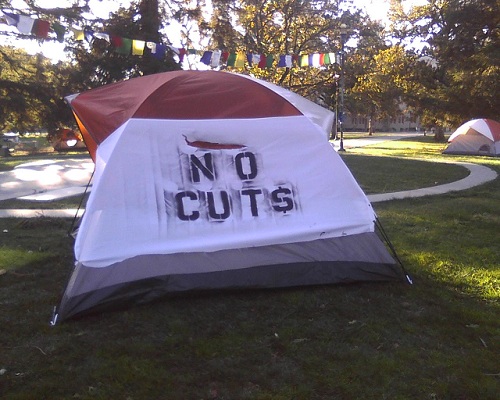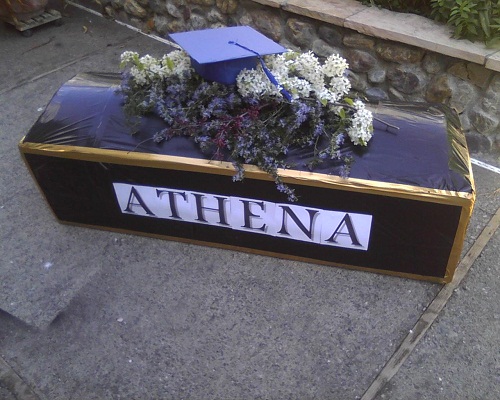

Part I. The Embedded View From the De-Militarized Zone
The photo above shows one of the few remaining tents on the UC Davis Quad, just 60 feet from the spot where campus police pepper sprayed a dozen students and catapulted this campus into the stratosphere of global celebrity last November.
The irony of the message "No Cuts" [to education] (spray-painted by the student demonstrators three months ago) and the torn tent (vandalized last week) is not accidental.
The tear in the tent is indicative of a deeper, bloodier cut that goes all the way to the bone of this campus and to the marrow of the entire university as a public institution. Within three days of the pepper spraying campus administrators were crafting their message around the phrase "a need for healing." While university administrators have tried to keep the wound "protected" to speed the recovery, the current conditions are more like remission than real recovery. This ambivalent, if painful, response to the conflict was noted by Chancellor Katehi herself in a 12/09/11 Huffington Post article where she summarized what she had heard in the many campus forums, as ranging "from those expressing anger and sadness about the incident itself to repeated comments that we cannot let one highly regrettable event define a great public research university."
After enduring for months, the few tents left on the Quad have a forlorn look. They are no longer "policed" and apparently no longer "Occupied." They stand out like a string of stark question marks about their own importance: "What, after all, was the great danger they once posed? How was that danger so clear and present that police were sent in to take them down the day after they went up?"
The public outcry over the pepper spraying may have died down to a muffled muttering. But the promises from the chancellor that there would be a speedy and thorough investigation -- now nearly four months old -- are not forgotten. They hang over this campus like a dull, gray, slowly fading, cloud. The investigative commission under former Justice Cruz Reynoso has repeatedly postponed the date when its findings will be issued and has already acknowledged that no information from the primary perpetrators -- Police Chief Spicuzza and Lt. Pike -- would not be included, due their personnel rights as university employees.
So speedy? Not. And thorough? Yet to be seen...
In fairness, it's true the wheels of justice (and those of academia) often turn exceedingly slow. But the UC Davis Academic Senate, itself, decided not to wait any longer for the commission's report. On February 24th a large majority of the faculty brought back a verdict of "confidence" in Chancellor Katehi. At the same time substantial minority, more than 300 faculty members, mostly within the College of Letters and Science, voted "no confidence" in the chancellor.
Following the vote, a spokesman for the majority, entomology Professor Walter Leal, interviewed by local media, commended the senate's action and described the conflict over the chancellor and the pepper sprayed students as "a distraction [and] we didn't want any more distraction." He went on to say, "The university now has to move on. The faculty has spoken. The message was very clear." When asked, "What about the students?" Professor Leal said: "It's one thing to support the students and another to give a vote of no confidence on the Chancellor when she's not the sole responsible person on this. We have to wait for the report to determine who is responsible."
Most recently a lawsuit was filed against the chancellor and other campus administrators by 19 of the UC Davis students who were either pepper sprayed or handcuffed and arrested on November 18th. The lawsuit alleges violations of the students' First Amendment rights. The students are being represented by the Northern California ACLU.
While signs of continued protest on campus have temporarily subsided, a core group of students involved in "Occupy UC Davis" events remains engaged in planning new actions and seems committed to continuing their fight against skyrocketing tuition increases.
Among the planned actions are a mock funeral for public education on the Davis campus (photo below) and a protest march to the state capitol in Sacramento on March 5th. The Davis students will be joined by scores of other UC students who plan to march all the way from the Berkeley campus to Davis and then on to Sacramento, a distance of more than 100 miles.
Next time: Part II. How Scarcity and Greed Disable the Faculties of Empathy and Conscience Within the Campus Community
